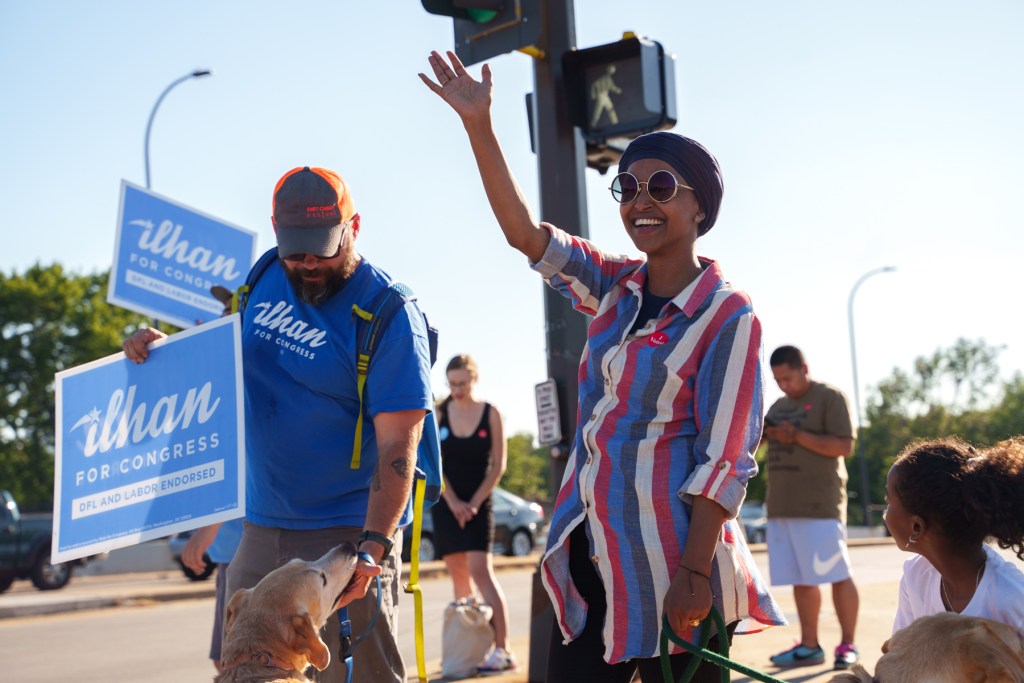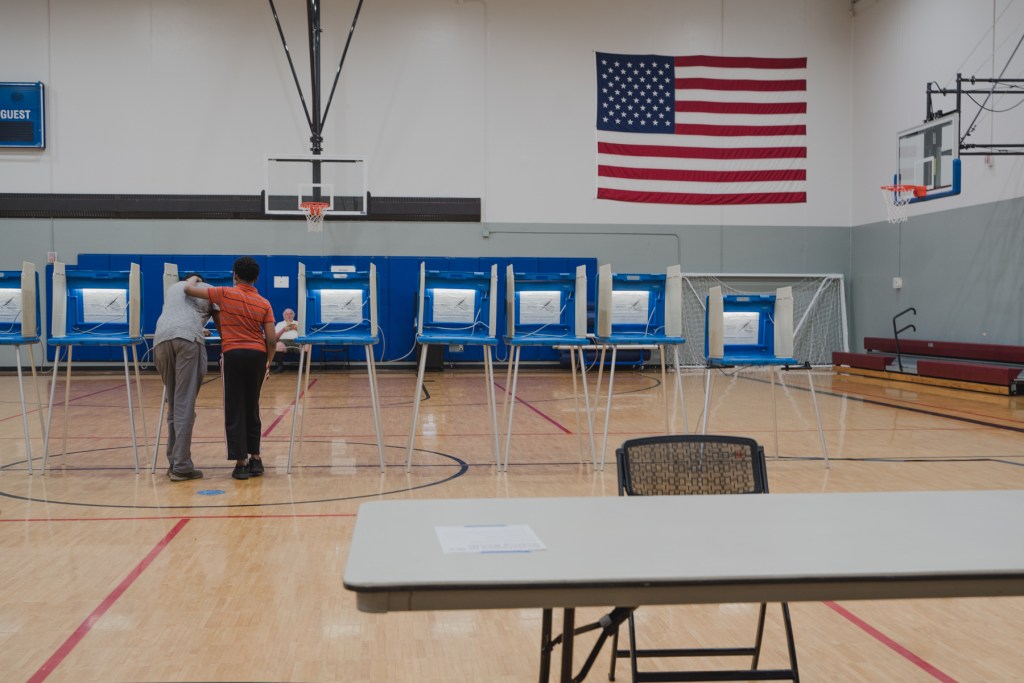John Thompson didn’t plan on a career in Minnesota politics.
A repair technician for St. Paul Public Schools, Thompson emerged as a prominent activist while protesting the 2016 police shooting of a friend and coworker, Philando Castile. In 2020, he won a seat representing St. Paul’s East Side in the Minnesota House of Representatives, pledging to fight for criminal justice reform, affordable housing, and free public transportation.
Thompson seemed no more attached to political niceties this past week as his tenure in the Minnesota House of Representatives neared its end. On Tuesday night, the St. Paul politician suffered an overwhelming loss to Liz Lee in the primary election.
Lee, a former congressional staffer, secured 89 percent of the vote in her victory against Thompson, who gathered 11 percent of the vote.
Having entered the house with a bold agenda, Thompson, 50, spent the past year responding to a series of scandals: a late-night traffic stop and a run-in with a St. Paul police officer; questions about his residency; and the release of police reports describing allegations of domestic violence. House Democrats voted last September to expel Thompson from the DFL caucus.
Despite his loss in the primary, Thompson sounded animated and unbowed on Thursday when he spoke to Sahan Journal by phone.
“I feel good. I’m still living, breathing and talking. I’m blessed and highly favored,” Thompson said. “I’m not going to go in this closet and hide.”
Thompson said he wasn’t surprised by the results of Tuesday’s primary. But he did express surprise that St. Paul voters cast their ballots for Lee–someone he said he had never heard of before the primary—in such considerable numbers.
“Where was she at post-Philando? Where was this woman at post-Jamar Clark?” Thompson asked, referring to Black men fatally shot by police. “Check her address,” he added—a reference to questions that surfaced about his Wisconsin driver’s license.
Liz Lee, 33, grew up in public housing on St. Paul’s East Side with her parents and four siblings.
“I’m not bitter about Liz Lee,” Thompson continued. “I hope she does well. I hope she wins by the way, because she ain’t won nothing yet. I don’t think that they actually put up a good fight. They actually just came in and put a lot of money in.”
He paused to count–aloud–the 30 Liz Lee and Betty McCollum mailers that he said arrived at his home over the past few weeks. The DFL outreach effort did not impress him.
“This party is full of shit,” he said.
A turbulent and controversial term
Thompson highlighted a few accomplishments from his term. He mentioned investments in his district: “I brought almost $7 million in investments to the East Side my freshman year,” Thompson said.
But then he pivoted back to the moments of controversy: “They don’t want to talk about that. They want to talk about me bullying police officers.”
In Thompson’s nearly 45-minute phone conversation with Sahan Journal, he seemed more keen on airing grievances than discussing points of pride from his work in office.
During his term, Thompson addressed his original campaign pledges to uplift the Black community in St. Paul. He introduced legislation to provide reparations to descendants of enslaved people in Minnesota, prohibit qualified immunity for police officers, and fund business developments in the East Side–something he hoped would “take the economic noose off” his community’s neck. These measures did not pass the legislature.
Thompson maintains that the various allegations that derailed his career were untrue and made in bad faith.
“Name one Black man who fought for human rights who hasn’t been slandered,” Thompson said. He then drew a parallel between his experiences and both Melvin Carter’s run for office and the Biblical Jesus.
“Jesus’ Black life–they still slandered Jesus’ name,” Thompson said.
Thompson ran as an independent in this week’s primary. In his conversation with Sahan Journal, he compared his ostracization from the Democratic Party to the 1955 murder of Emmett Till, the Black Mississippi teenager who was lynched after a white woman alleged he’d harrassed her in a grocery store.
“I remember who pointed out Emmett Till and got him killed. The attack never changed, just the faces,” he said. “We got to silence this Black man because he’s telling too much of the truth,” he continued.
Republicans and top Democrats, including Governor Tim Walz and Lieutenant Governor Peggy Flanagan, called for Thompson’s resignation last year following controversies that began with a traffic stop.
After pulling over Thompson for a missing front license plate, a police officer discovered that the state had revoked Thompson’s driving privileges for failing to pay child support. Thompson accused the officer of racial profiling.
“You pulled me over because you saw a Black face in this car, brother,” Thompson said in body camera footage of the traffic stop.
The officer also found that Thompson carried a Wisconsin driver’s license that he had last renewed after his election to the Minnesota legislature. This discovery raised questions about Thompson’s eligibility for office.
In the search for more information about Thompson’s residency, Fox 9 surfaced five police reports detailing domestic violence allegations against Thompson. Thompson and his lawyer denied the allegations.
The controversy surrounding Thompson posed a moral quandary for many racial and gender justice activists. While many Democrats have pushed for a zero-tolerance policy on gender-based violence, some progressives worried that Thompson was being singled out, while white politicians avoided censure.
related stories
“I believe survivors every single time,” Asma Mohamed, advocacy director at Reviving the Islamic Sisterhood for Empowerment, told Sahan Journal last July. “And I also know Black men are being held to a different standard. And I think John Thompson is being held to a standard we would not expect of anyone else.”
Thompson said that bad-faith accusations, rather than his own actions, led to his loss in the primary. “There’s no way you’d beat John Thompson without slander. You can’t,” he said, referring to himself in the third person.
‘I refuse to conform’
Thompson didn’t think that his time in office allowed him to effect the sort of change that he’d wanted.
“Here I am right now in 2022 and we’re talking about police reform. Police will never be reformed,” he said. Thompson noted that Americans have been discussing police reform for decades.
“They’d rather see these cookie cutters who’ve never been through any type of adversity. If we get Scott Jensen, if we get Governor Walz, we get the same thing: a white man running the state.”
He placed the blame in part on the homogeneity of politics. “They’d rather see these cookie cutters who’ve never been through any type of adversity,” Thompson said. “If we get Scott Jensen, if we get Governor Walz, we get the same thing: a white man running the state.”
His term in office, he said, was his chance to break the mold.
“I was never doing this for the money, or the fame, or the accolades. I was actually doing this for our people who don’t have a voice at the state capitol,” Thompson said. “I refuse to conform, because the system won’t conform for my people.”
What comes next?
Thompson’s vocal activism around police shootings and racial justice thrust him into the political limelight. But he now sounds less sure of himself and what his future holds. Before taking any next steps, he said that he needed to talk with his loved ones first.
“I don’t make any decisions without my family,” he said.
The representative didn’t mince words when asked what he learned from his term.
“I learned that politics is full of shit,” he said, laughing. “And that some of our favorite politicians are the same way–full of shit. And you can quote me on that. I mean that in the most disrespectful way.”












